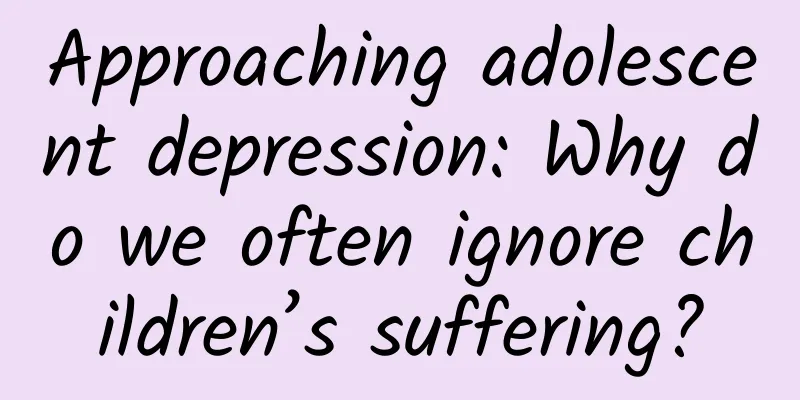Approaching adolescent depression: Why do we often ignore children’s suffering?

|
In recent years, the popularity and development of the Internet has made it easier to obtain information, and adult depression has gradually entered the public eye. However, at the same time, more and more minors, especially teenagers, are troubled by mental and emotional problems, among which depression is the most common. According to the "2022 Youth Mental Health Status Survey Report" released by the Institute of Psychology of the Chinese Academy of Sciences, about 14.8% of teenagers are at risk of depression to varying degrees, and the mental health safety of Chinese teenagers has become increasingly prominent. Today is World Mental Health Day. Let us enter the inner world of children and listen to their real voices. 01 How can children be depressed? In fact, they are more sensitive to emotions than adults "Other people's children are so sunny, why can't you learn from them?" "If you don't have to worry about food or clothing, what else is there to be unhappy about?" … Have you ever heard these words or said them to your children? In real life, many parents cannot empathize with their children's emotions, thinking that their children are pretending to be sick or are rebellious during adolescence, and even criticize their children for this, without really understanding the complex causes and emotional pressure behind it. Studies have shown that genetic factors, biological factors, psychological trauma and environmental pressure may be related to this. Copyright image, no permission to reprint First of all, we must make it clear that depression and depression are different. Depression refers to a state of low mood and loss of interest in a short period of time. In most cases, it will get better on its own and the mood will gradually return to normal. Depression refers to a disease in which this state lasts for a long time, is difficult to improve, and has begun to significantly affect normal life. Patients need help from professionals. Adolescent depression refers to a mental disorder in which adolescents aged 13-19 have persistent low mood, loss of interest and pleasure, often accompanied by insomnia, loss of appetite, weight loss, inattention, decreased self-esteem, loss of confidence in the future, etc. The number of adolescent depression patients has been increasing year by year in recent years, and the age of the patients is gradually getting younger. The prevalence rate is about 4% to 8%. These symptoms last for a long time, have a serious impact on the study and life of adolescents, and may even lead to tragedies such as suicide. 02 Being well-behaved, sensible and obedient may just be their “protective color” Contrary to what many people think, the survey found that the more excellent the academic performance and the more obedient the children are, the greater the probability and proportion of them suffering from mental illnesses such as depression and anxiety. There are many reasons why they are more likely to suffer from depression, mainly including the following: 1. Higher requirements Outstanding children often have perfectionist tendencies. Something that may be a huge achievement for ordinary people may only be considered normal performance for an outstanding child. The higher they strive, the more difficult it will be to achieve their goals. Once they encounter setbacks or failures, they will feel frustrated and lost, which may lead to depression. 2. Excessive stress Excellent children face tremendous pressure in learning, life, social life, etc. They are often expected to always be excellent in all aspects. Long-term stress and tension will cause children's physical and mental exhaustion, which can easily lead to depression. Copyright image, no permission to reprint 3. Lack of social support Excellent children often invest more time and energy in learning and self-improvement, while neglecting the establishment of social and interpersonal relationships. Once they encounter setbacks, they have nowhere to vent their inner pain and cannot properly deal with their negative emotions. Lack of social support can make children feel lonely and helpless, thereby increasing the risk of depression. 4. Family factors Family factors such as a disharmonious family atmosphere, parental divorce, and the death of a loved one can have a serious impact on a child's psychology, making it easy for them to develop depression. 5. Physiological factors Physiological factors such as neurotransmitter imbalance and endocrine disorders can affect children's emotions and psychological state, thereby increasing the risk of depression. Copyright image, no permission to reprint 03Be careful! These 8 "help" signals from children may be a precursor to depression Depression can be relieved and treated, and early identification and prevention are particularly important. Therefore, parents must pay more attention to their children's emotions. How to judge whether your child is depressed? In fact, the two most effective ways are verbal communication and careful observation to discover the following common manifestations of depression: 1. Depression: Feeling persistently depressed, feeling that life is meaningless, and losing confidence in the future. 2. Loss of interest: Losing interest in things that you used to be interested in, or even being unwilling to participate in activities that you used to enjoy. 3. Anhedonia: Inability to experience pleasure, feeling boredom even when doing things you used to enjoy. 4. Insomnia: Lack of sleep leads to insomnia symptoms, including difficulty falling asleep, shallow sleep, early awakening, etc. 5. Loss of appetite: No desire to eat, loss of appetite, leading to weight loss. 6. Inattention: Difficulty concentrating, obvious decline in memory, and poor academic performance. 7. Decreased self-evaluation: The patient feels guilty and thinks that he is a burden to others, feels sorry for others, feels that he is worthless and has no value in living. 8. Suicide: The patient has thoughts of self-harm and suicide, begins to plan suicide, and even attempts suicide. This is the most dangerous signal. At this time, the patient's condition is already very serious. If he cannot get help from professionals in time, the consequences will be disastrous. In fact, quite a number of early-stage depression patients are not aware of what is happening to them, but they will quietly test their family and friends in daily conversations to understand their specific views on the situation. If people around them give more positive and encouraging words, it can often help them quickly get rid of the symptoms and get better naturally. When children feel that their parents understand and support them, they will also put down their burdens appropriately and arouse their own fighting spirit to defeat the "monster" in their hearts. 04 Conclusion Whether adults or children, we will all encounter negative emotions. Adolescent depression is a serious mental illness that requires adequate attention and concern. Parents and educators should pay attention to their children's mental health, promptly detect and deal with early distress signals of depression, and avoid tragedies. At the same time, we should continue to pay attention to children's mental health issues, establish a good mental health curriculum and education system, help them reduce stress, build social support, maintain a good physiological state, etc., so as to reduce the risk of depression. There is a saying: "Lucky people are healed by their childhood throughout their lives." Children's mental health is closely related to their physical health. Let us start with care and love, and strive to let them embrace a better future! author: Tang Yicheng, China Science Popularization Expert, Secretary General of the Science Popularization Committee of the Chinese Psychological Society Wang Xiang Chief Writer, Beijing China Science Popularization Center for Mental Health Promotion Reviewer: Fan Chunlei, Associate Researcher, Institute of Psychology, Chinese Academy of Sciences Produced by: Science Popularization China Produced by: China Science and Technology Press Co., Ltd., China Science and Technology Publishing House (Beijing) Digital Media Co., Ltd. |
<<: What? Scientists have found the secret to keeping tomatoes firm and tasty!
>>: Microwave oven is also a “stove”, why can’t it be used to boil water?
Recommend
How to layout the information flow landing page? 3 tips to help you retain customers~~
In an information flow advertisement , the role o...
12 open source frameworks to watch for Java, Web, and mobile development in 2018
The Spring Festival is coming, and many developer...
Urgent Science | Attention! New variant of COVID-19 - "Omicron"
The newly discovered new variant of the coronavir...
The fish you eat most often are actually the nightmare of Americans? !
Speaking of carp, you may forget what it tastes l...
Han EV Standard Range Luxury Edition is launched, setting a new benchmark for the value of 200,000+ mid-range and high-end pure electric sedans
Recently, BYD announced that the "world'...
Who is healthier, a person with thick tongue coating or a person with thin tongue coating? The answer is…
Have you ever observed your tongue coating? In th...
Microsoft's Black Technology: Ordinary Cameras Transformed into 3D Remote Sensing Sensors
At this year's SIGGRAPH 2014 World Conference...
Longyan Mini Program Agency Company, how much does it cost to be an agent for a book mini program?
Why should you be an agent for WeChat Mini Progra...
WeChat group traffic diversion and operation methods!
Nowadays, many people believe that WeChat groups ...
Peng Lei: Worried about becoming an Internet antique
On August 27, the Internet Conference was held in...
A 4-year-old girl in Shanghai got lost on the beach! There are many dangers near the water that you would never imagine...
These days, the safety of the missing 4-year-old ...
How do you attract people to your short video startup live streaming room? How to position yourself when making short videos?
In the past, everyone has been emphasizing how to...
I have a user portrait, but why can’t I understand the user?
The concept of user portrait has been around for ...









